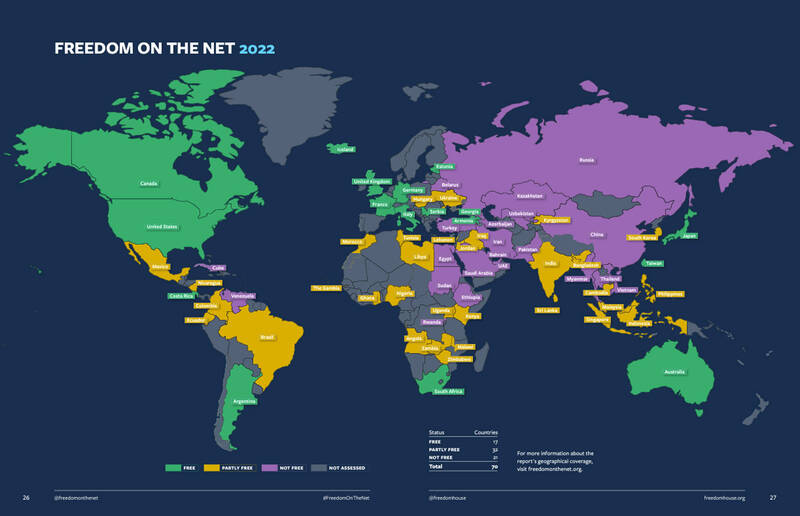Taiwan ranked fifth in Internet freedom worldwide and first in Asia, while China remained at the bottom of the list, an annual report released yesterday by the US nonprofit organization Freedom House said.
Topping this year’s Freedom on the Net report were Iceland, Estonia, Costa Rica and Canada, while Taiwan and the UK tied for fifth during the one-year period that ended in May.
Taiwan retained the same ranking as last year in the Freedom House survey and analysis that ranks countries based on its assessment of obstacles to Internet access, limits on content and breaches of user rights.

Photo from the 2022 Freedom House Freedom on the Net report
Taiwan is an example of how the private sector can work with civil society, government entities and academia to design innovative responses to online danger, the report said.
In Taiwan, which faces a barrage of disinformation that can be traced to China, Japan-based messaging application Line worked with civic groups to develop a tool for users to report false information trending on its platform, the report said.
The government launched a similar coordination effort following the Russian invasion of Ukraine, aiming to track war-related disinformation emanating from China, Freedom House said.
On the other end of the spectrum, China was listed as the worst abuser of Internet freedom for the eighth consecutive year, below Iran and Myanmar.
Internet censorship in China intensified during the Beijing Olympics and after Chinese tennis star Peng Shuai (彭帥) accused a high-ranking Chinese Communist Party (CCP) official of sexual assault, Freedom House said.
The Chinese government has continued to tighten its control over the nation’s booming technology sector, adopting among other measures new rules that require platforms to use their algorithm to promote CCP ideology, the report said.
For this year’s report, Freedom House surveyed 70 countries, which account for 89 percent of the world’s Internet users, and it ranked 17 as “free,” including Taiwan and Japan, while 32 were rated as “partly free” and 21 as “not free.”
Global Internet freedom slid for the 12th consecutive year, with the sharpest downgrades documented in Russia, Myanmar, Sudan and Libya, the report said.
Following Russia’s invasion of Ukraine, the Kremlin dramatically intensified its ongoing efforts to suppress domestic dissent and accelerated the closure or exile of the country’s remaining independent media outlets, it said.
In at least 53 countries, users faced legal repercussions for expressing themselves online, which often led to draconian prison terms, said Freedom House, a Washington-based nonprofit organization that conducts research and advocacy on democracy, political freedom and human rights.
However, Internet freedom improved in a record 26 countries, the report said.

CHAOS: Iranians took to the streets playing celebratory music after reports of Khamenei’s death on Saturday, while mourners also gathered in Tehran yesterday Iranian Supreme Leader Ayatollah Ali Khamenei was killed in a major attack on Iran launched by Israel and the US, throwing the future of the Islamic republic into doubt and raising the risk of regional instability. Iranian state television and the state-run IRNA news agency announced the 86-year-old’s death early yesterday. US President Donald Trump said it gave Iranians their “greatest chance” to “take back” their country. The announcements came after a joint US and Israeli aerial bombardment that targeted Iranian military and governmental sites. Trump said the “heavy and pinpoint bombing” would continue through the week or as long

TRUST: The KMT said it respected the US’ timing and considerations, and hoped it would continue to honor its commitments to helping Taiwan bolster its defenses and deterrence US President Donald Trump is delaying a multibillion-dollar arms sale to Taiwan to ensure his visit to Beijing is successful, a New York Times report said. The weapons sales package has stalled in the US Department of State, the report said, citing US officials it did not identify. The White House has told agencies not to push forward ahead of Trump’s meeting with Chinese President Xi Jinping (習近平), it said. The two last month held a phone call to discuss trade and geopolitical flashpoints ahead of the summit. Xi raised the Taiwan issue and urged the US to handle arms sales to

A magnitude 5.6 earthquake struck off the coast of Yilan County at 12:37pm today, with clear shaking felt across much of northern Taiwan. There were no immediate reports of damage. The epicenter of the quake was 16.9km east-southeast of Yilan County Hall offshore at a depth of 66.8km, Central Weather Administration (CWA) data showed. The maximum intensity registered at a 4 in Yilan County’s Nanao Township (南澳) on Taiwan’s seven-tier scale. Other parts of Yilan, as well as certain areas of Hualien County, Taipei, New Taipei City, Taoyuan, Hsinchu County, Taichung and Miaoli County, recorded intensities of 3. Residents of Yilan County and Taipei received

Taiwan has secured another breakthrough in fruit exports, with jujubes, dragon fruit and lychees approved for shipment to the EU, the Ministry of Agriculture said yesterday. The Animal and Plant Health Inspection Agency on Thursday received formal notification of the approval from the EU, the ministry said, adding that the decision was expected to expand Taiwanese fruit producers’ access to high-end European markets. Taiwan exported 126 tonnes of lychees last year, valued at US$1.48 million, with Japan accounting for 102 tonnes. Other export destinations included New Zealand, Hong Kong, the US and Australia, ministry data showed. Jujube exports totaled 103 tonnes, valued at